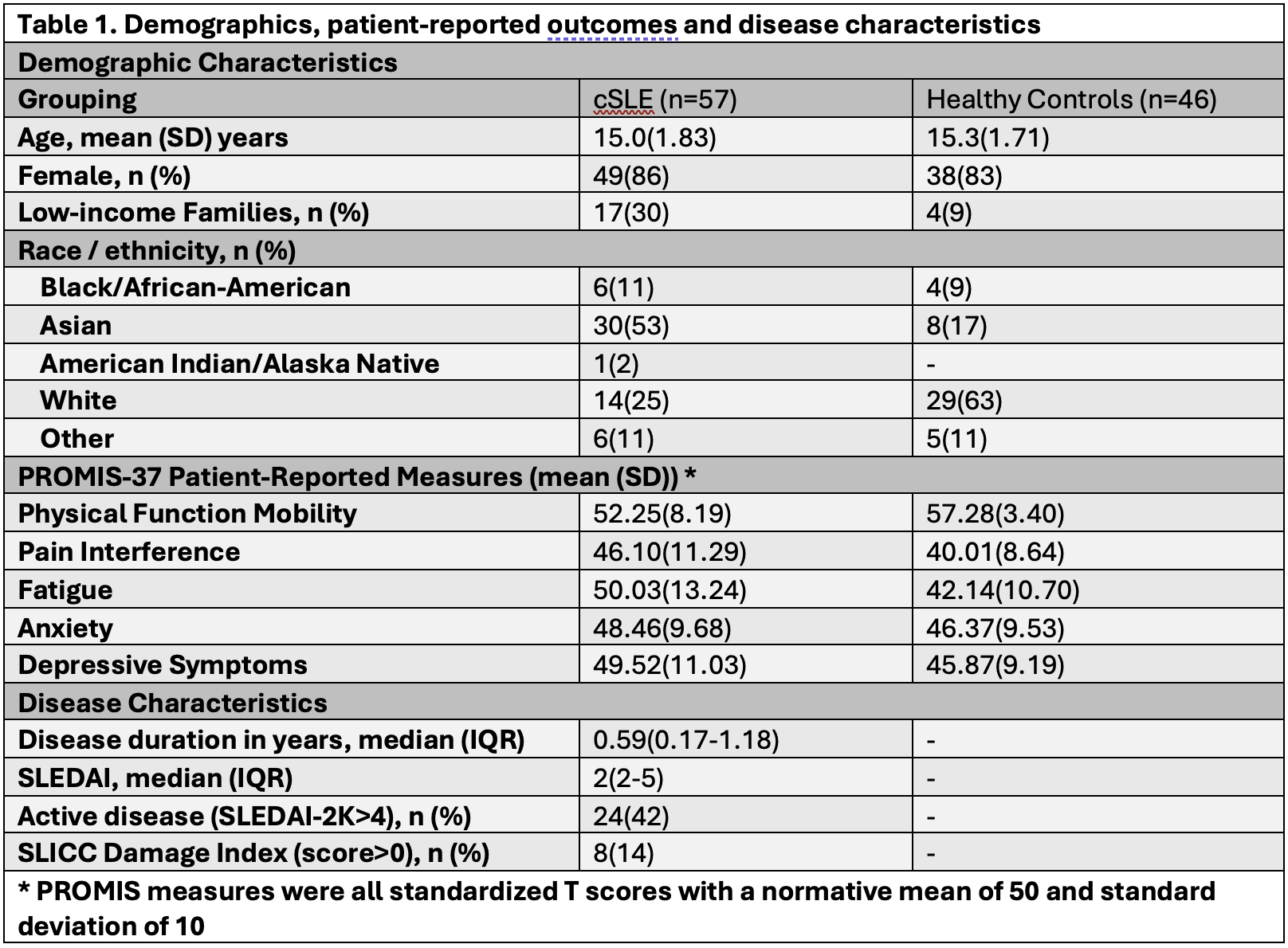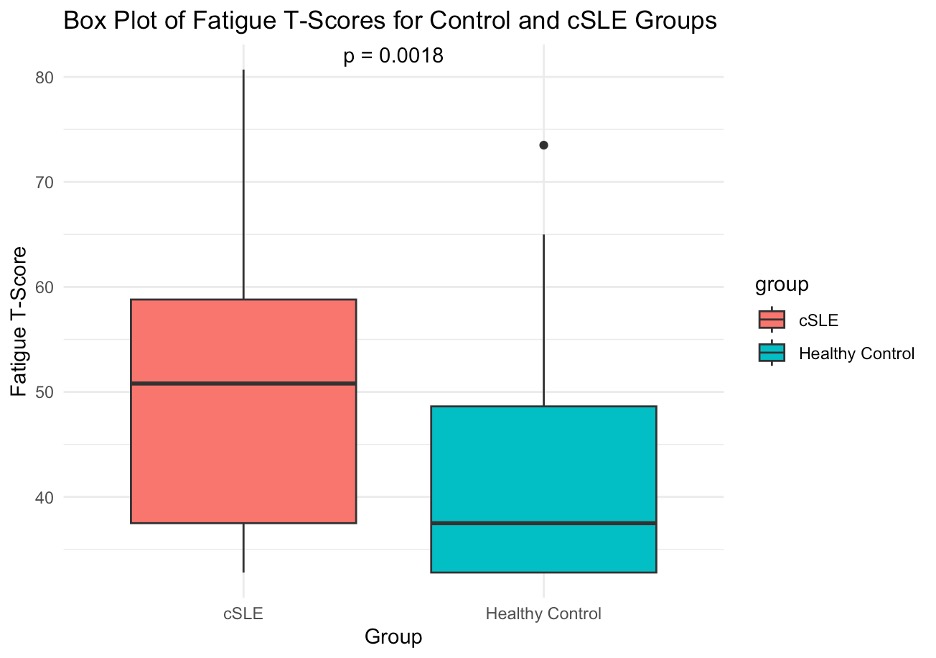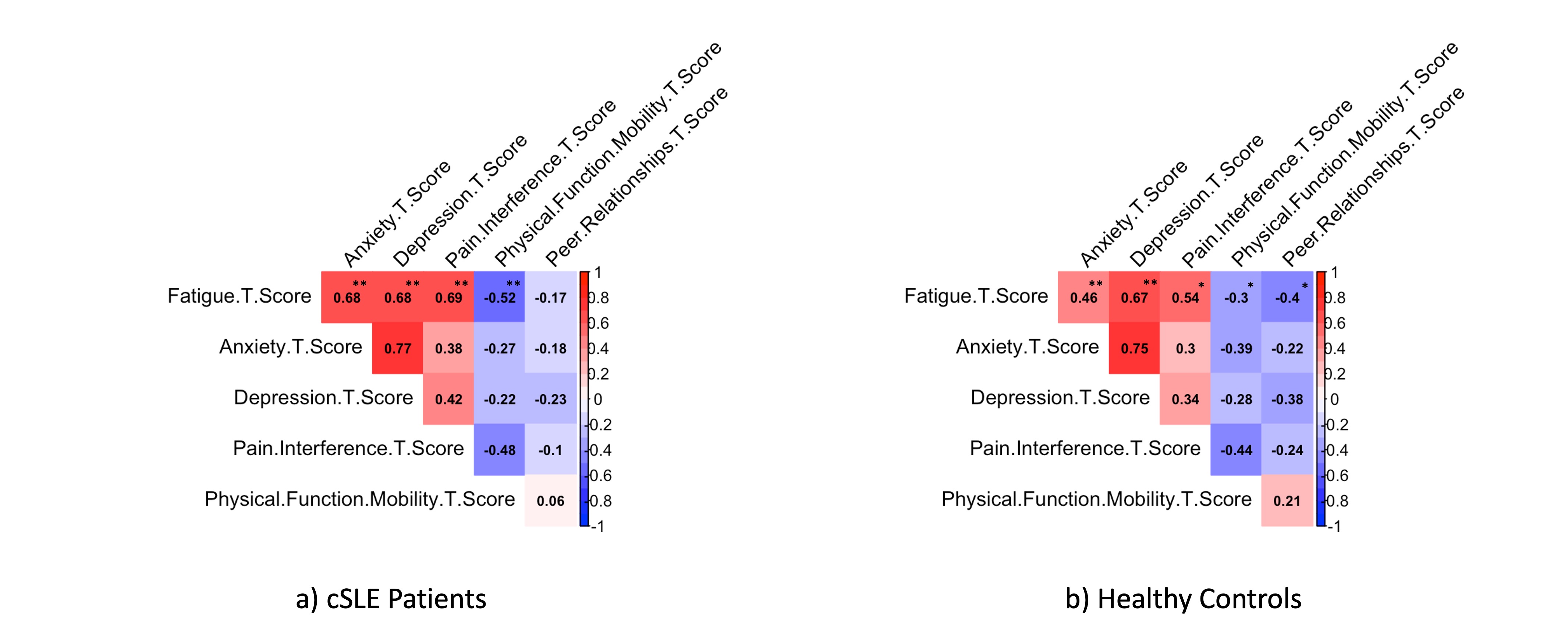Session Information
Session Type: Poster Session B
Session Time: 10:30AM-12:30PM
Background/Purpose: Fatigue is a prevalent and distressing symptom in childhood-onset systemic lupus erythematosus (cSLE), affecting up to 74% of patients with potential for adverse effects on daily functioning and quality of life. Despite its prevalence, there remains limited understanding of the impact of fatigue on mental and physical health outcomes for youth with cSLE. This study aimed to examine: 1) fatigue levels in youth with cSLE compared to healthy controls, 2) the relationship between fatigue and health outcomes (both mental and physical) in youth with cSLE.
Methods: This cross-sectional study analyzed prospectively collected data from a cohort of youth aged 10-17 years old meeting the ACR-1997 or SLICC classification criteria for SLE. Healthy controls were matched by age and sex. Participants completed the Patient-Reported Outcomes Measurement Information System (PROMIS)-37 Pediatric Profile, assessing fatigue levels, as well as mental (anxiety, depressive symptoms, and peer relationships) and physical health outcomes (pain interference, physical function mobility). Additional physical health outcomes specific to cSLE were SLEDAI and disease damage scores abstracted from the medical chart. We compared mean PROMIS T-scores for fatigue between groups using a Mann-Whitney U test. Spearman’s rank correlation examined associations between fatigue levels and the mental and physical health outcomes.
Results: Fifty-seven cSLE patients (mean age 15.04 ± SD 1.83 years, 85.97% female), and 46 non-cSLE controls were included in the study (Table 1). cSLE patients exhibited significantly higher fatigue scores compared to controls (PROMIS T-Score =50 vs 42, p=0.002, Figure 1). In the cSLE and control groups, statistically significant correlations were observed between heightened fatigue and mental health outcomes of anxiety and depressive symptoms (Figure 2). Fatigue was moderately negatively correlated with peer relationships in controls, but not in cSLE patients. For physical health outcomes in both groups, fatigue showed a statistically significant correlation with pain interference and negatively correlated with physical function mobility, stronger in the cSLE group (Figure 2).
Conclusion: In this cSLE cohort, self-reported fatigue levels were higher than age and sex matched healthy peers. These results indicate that fatigue is not only prevalent in cSLE patients but also significantly associated with various aspects of mental and physical health. While the associations were similar to those in controls, the stronger correlations observed in cSLE patients indicate that fatigue may have greater adverse impact on patients’ overall well-being and quality of life relative to their healthy peers. Future analyses will explore the role of modifiable risk factors (depression, anxiety, pain, and physical function) as well as other contributors to fatigue in cSLE, to guide potential interventions and assist in improving the quality of life for those living with cSLE.
To cite this abstract in AMA style:
Hogarth H, Jaffan J, El Tal T, Mwizerwa O, Jeyanathan A, Mohamed I, Ng L, Moaf P, Law J, Boulard L, Danguecan A, Davis A, Hiraki L, Levy D, Knight A. The Effects of Fatigue on Self-Reported Mental and Physical Health in Childhood-Onset Systemic Lupus Erythematosus: A Cross-Sectional Study [abstract]. Arthritis Rheumatol. 2024; 76 (suppl 9). https://acrabstracts.org/abstract/the-effects-of-fatigue-on-self-reported-mental-and-physical-health-in-childhood-onset-systemic-lupus-erythematosus-a-cross-sectional-study/. Accessed .« Back to ACR Convergence 2024
ACR Meeting Abstracts - https://acrabstracts.org/abstract/the-effects-of-fatigue-on-self-reported-mental-and-physical-health-in-childhood-onset-systemic-lupus-erythematosus-a-cross-sectional-study/



